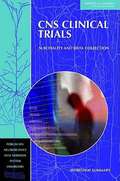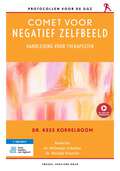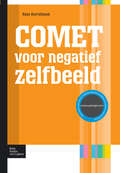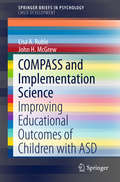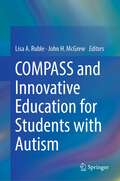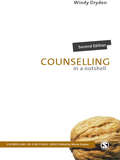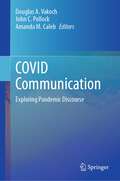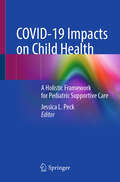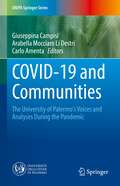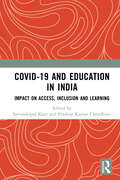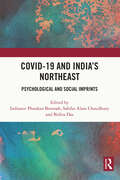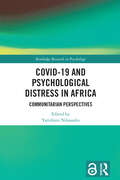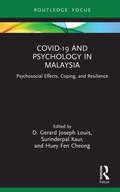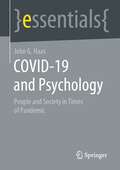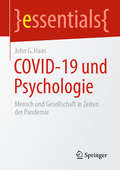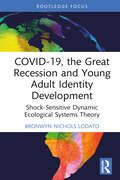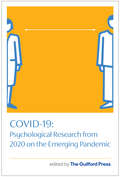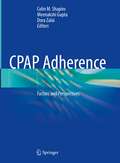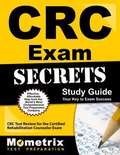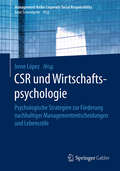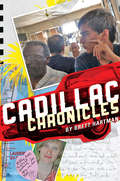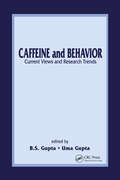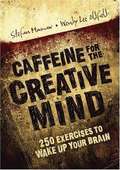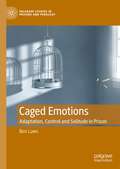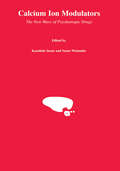- Table View
- List View
CNS Clinical Trials: Suicidality And Data Collection - Workshop Summary
by Institute of Medicine of the National AcademiesThe Food and Drug Administration (FDA) now requires that all clinical trials for drugs that affect the central nervous system--including psychiatric drugs--are assessed for whether that drug might cause suicidal ideation or behavior. The IOM's Forum on Neuroscience and Nervous System Disorders hosted a meeting on June 26, 2009, to discuss the FDA's new policy and how to analyze best whether suicidal thoughts predict actual suicidal behavior in the near future.
COMET voor negatief zelfbeeld: Handleiding voor therapeuten (Protocollen voor de ggz)
by Kees KorrelboomDit boek is een handleiding voor COMET, een kortdurende bewezen effectieve behandelmethode voor zelfbeeldproblematiek. COMET voor negatief zelfbeeld is gebaseerd op de principes en uitgangspunten van Competitive Memory Training (COMET). De methode geeft goede behandelresultaten op verschillende probleemgebieden, waaronder negatief zelfbeeld. COMET kan gecombineerd worden met cognitieve gedragstherapie voor diverse andere problemen, zoals stemmingsproblemen, psychose, autisme, eetstoornissen, persoonlijkheidsproblematiek, of een angststoornis.Deze 2e editie van dit veelgebruikte behandelprotocol COMET voor negatief zelfbeeld is volledig geactualiseerd. In deze nieuwe editie ligt de focus op de toepassing in de individuele therapie, daarnaast kan het ook voor behandeling in groepen gebruikt worden. De behandeling wordt stap voor stap beschreven. Daarbij wordt de praktijk uitvoerig geïllustreerd aan de hand van casuïstiek en videofragmenten van therapiesessies. Het behandelprotocol COMET voor negatief zelfbeeld bestaat uit een handleiding voor de therapeut en een werkboek voor de cliënt: Verbeter uw zelfbeeld in 7 stappen.COMET voor negatief zelfbeeld is onderdeel van de reeks Protocollen voor de ggz. Elk deel geeft een stapsgewijze omschrijving van de behandeling van een specifieke psychische aandoening weer. De theorie is beknopt en berust op wetenschappelijke evidentie. Protocollen voor de ggz is bedoeld voor psychologen, psychotherapeuten, psychiaters en andere hulpverleners.
COMET voor negatief zelfbeeld: competitive memory training bij lage zelfwaardeing en negatief zelfbeeld (Protocollen voor de GGZ)
by Kees KorrelboomCOMET voor negatief zelfbeeld is een protocol voor hulpverleners in de geestelijke gezondheidszorg die cliënten met zelfbeeldproblematiek behandelen. Hierbij wordt lage zelfwaardering niet alleen als symptoom gezien van bijvoorbeeld een onderliggende depressie of angststoornis, maar ook als een apart probleem dat behandeling verdient. Het protocol is gebaseerd op de principes en uitgangspunten van Competitive Memory Training (COMET). COMET geeft goede behandelresultaten op verschillende probleemgebieden, waaronder negatief zelfbeeld. Deze therapie kan gecombineerd worden met cognitieve gedragstherapie voor stemmingsproblemen, eetstoornissen, persoonlijkheidsproblematiek of een angststoornis. Bestel ook 'Verbeter uw zelfbeeld in 7 stappen', het werkboek voor de cliënt die kampt met een negatief zelfbeeld. COMET voor negatief zelfbeeld is onderdeel van de reeks 'Protocollen voor de GGZ'. Elk deel geeft een sessiegewijze omschrijving van de behandeling van een specifieke psychische aandoening weer. De theorie is beknopt en berust op wetenschappelijke evidentie. Protocollen voor de GGZ is bedoeld voor psychologen, psychotherapeuten, psychiaters en andere hulpverleners.
COMPASS and Implementation Science: Improving Educational Outcomes of Children with ASD (SpringerBriefs in Psychology)
by John H. Mcgrew Lisa A. RubleThis Brief examines COMPASS - the Collaborative Model for Promoting Competence and Success - a consultation-based intervention specialized for children with Autism Spectrum Disorder (ASD). Based on the Evidence-Based Practices in Psychology (EBPP) framework, the volume describes the processes that strengthen the expert support relationships between consultant and teacher (i. e. , implementation) and between teacher and student (i. e. , intervention). In addition, the Brief addresses how consultation methods work within COMPASS, with teachers learning from consultants' implementation methods to tailor instructions that are specific to students' educational and personal factors. This unique framework corresponds with current, widespread research and aims to provide more effective educational services for students with ASD during their crucial formative years. Topics featured in this text include: COMPASS practice outcome based on idiographic assessment and measures of quality. Evidence for the efficacy of COMPASS. COMPASS implementation quality. COMPASS intervention quality and active ingredients. Teacher and student internal and external factors impacting COMPASS. COMPASS and Implementation Science is a must-have resource for clinicians, scientist-practitioners, researchers, and graduate students in the fields of child and school psychology, behavioral therapy, and social work as well as rehabilitation, special education, and speech pathology.
COMPASS and Innovative Education for Students with Autism
by Lisa A. Ruble John H. McGrewThis book examines the five primary areas of the Collaborative Model for Promoting Competence and Success (COMPASS). It describes COMPASS as an evidence-based practice in psychology (EBPP) versus an evidence-based practice (EBP) and discusses how it informs innovative individualized education program (IEP) goal setting., planning, and implementation through teacher coaching. In addition, the book introduces the common elements necessary for improved teaching plan quality and child goal attainment in maximizing educational outcomes. It also describes the extension of COMPASS to transition-age high school students with autism as well as the integration of current research findings from NIH-funded studies for transition-age youth and professional development and training. Finally, the book explores innovative methods to support the consistent implementation and expansion of COMPASS across school, home, and community settings. It discusses how to integrate classroomwide performance assessment to identify students in need of the focused instruction that COMPASS provides.Key areas of coverage include:Identifying personalized goals and intervention strategies (i.e., EBPs) using an EBPP framework within COMPASS for students with autism.Advances in measurement of IEP quality for transition-age autistic youthIntegration of accessible online educational materials necessary to implement COMPASS feasibly when implemented by school consultants and autism trainersLessons learned from professional development and training of community-based autism school consultants for developing high quality intervention plans.COMPASS IEP goal attainment and fidelity outcomes with face-to-face, telecoaching, and electronic feedback.COMPASS and Innovative Education for Students with Autism is an invaluable resource for educators, clinicians, scientist-practitioners, and therapists as well as researchers, professors, and graduate students in the fields of child and school psychology, behavioral therapy, and social work as well as rehabilitation, special education, speech pathology, and all interrelated disciplines.
COUNSELLING in a nutshell (Counselling in a Nutshell)
by Windy DrydenSeminars by Professor Windy Dryden. See the man live and in action. To find out more and to book your place go to www. cityminds. com ________________________________________ `Size-wise, these books span an open palm and have a very handy flap on the back and front as an integral feature of the cover which can be used as a bookmark. They are concise, yet thorough, providing introductions to the key elements of the theory and practice underpinning major therapeutic approaches… [An] ideal 'intro'… I would recommend these books because, 'in a nutshell', they work' - Therapy Today 'In a book aimed principally at those just embarking on counselling training Windy Dryden offers a down-to-earth introduction to the theory and practice of counselling which will serve to aid and inspire trainees' - Professor Brian Thorne, Co-founder, The Norwich Centre and Emeritus Professor of Counselling, University of East Anglia What is counselling and how does it work? Counselling in a Nutshell provides the answers to these questions and more, as part of a step-by-step guide to the counselling relationship and the therapeutic process. Focusing on the commonalities within the main theoretical approaches - psychodynamic, person-centred and cognitive-behavioural - Windy Dryden describes a framework which underpins all counselling, irrespective of the approach being used. Key features of the framework include: o bonds between counsellor and client o goals and tasks of counselling o stages of the therapeutic process o core therapeutic conditions. Counselling in a Nutshell provides a concise introduction to core components of the therapeutic relationship and process and is suitable for counsellors of all orientations.
COVID Communication: Exploring Pandemic Discourse
by Douglas A. Vakoch Amanda M. Caleb John C. PollockThis book focuses on how we understand COVID-19—medically, socially, and rhetorically. Given the expectation that other flu pandemics will occur, it stresses the importance of examining how the public response is shaped in the face of global health emergencies. It considers questions such as how can pandemic language both limit and expand our understanding of disease as biomedical, social, and experiential? In what ways can health communication be improved through the study and application of rhetoric and the health humanities? COVID Communication fills a gap in the pandemic literature by promoting interdisciplinary analysis of communication methods, realized through a health humanities approach. It centers human experience and culture within conversations about the biological reality of a pandemic. This volume will be a welcome contribution to the scientific investigations and practice of psychology and public health professionals.Interdisciplinary perspectiveNew insights on how a pandemic is understoodHighlights the relevance to important usually neglected relevance for psychology and public health professionalsEndorsements of COVID Communication “In an era of the COVID-19 pandemic crisis, COVID Communication provides a smart, urgent alternative to our collective downward spiral, not only offering a fiery critique of our selfish and self-destructive present but also providing galvanizing, positive visions of what futures we might hope for.” — Shailendra Saxena, King George’s Medical University, India; editor of Coronavirus Disease 2019 (COVID-19): Epidemiology, Pathogenesis, Diagnosis, and Therapeutics “COVID Communication shows that the pandemic affects us not only because it makes us sick or ruins our economy, but also because of how it is spoken, written, and thought about, ultimately because of how it is socially constructed. An original and very necessary look to arm ourselves intellectually against the pandemic.” — Alberto del Campo Tejedor, Pablo de Olavide University, Spain; author of La infame fama del andaluz “The COVID-19 pandemic represented a global challenge that needed nations and their people to come together, find a joint response, and build a narrative that was clear, consistent, inclusive, and respectful of people. The reality, however, is that the responses to the pandemic reflected the ideologies of national leaders, political leaders, media outlets, and activists, leading to a fragmented and at times polarized global discourse. This important work examines the different narratives that circulated within the information environment to explore how these may have led to differing levels of trust in politicians, in science, and in one another. Through an analysis of rhetoric across diverse nations and platforms, the chapters provide a framework that is crucial for understanding the interplay between discourse, cognition, and behavior.” — Darren Lilleker, Bournemouth University, UK; co-editor of Political Communication and COVID-19: Governance and Rhetoric in Times of Crisis “This book presents a collection of must-read scholarly chapters that illustrate a panoramic view of how people from different countries and cultures communicate about this global pandemic. These chapters paint a rich canvas of thoughts, emotions, reactions, and actions through communication expressions, ranging from intuitive rhetoric and probing cartoons to emotional memes and creative advertising. The book is a great resource for aiding health communication scholars, instructors, professionals, journalists, and students in enhancing their COVID-19 research, teaching, practice, reporting, and learning.” —
COVID-19 Impacts on Child Health: A Holistic Framework for Pediatric Supportive Care
by Jessica L. PeckThis book addresses the holistic impacts of COVID-19 on child health and gives a supportive framework for interprofessional pediatric teams serving children across the care continuum. The COVID-19 pandemic radically altered fundamental norms of pediatric care delivery across the service continuum. While the public rapidly adopted an echoing narrative that children were not severely impacted by physical disease burden, growing concern emerged regarding long-term holistic health impacts with diagnoses like myocarditis, COVID-toes, long-COVID, and other unique pediatric manifestations. Sequelae arising from detrimental health impacts rapidly escalated. Inequity dominated analysis of the alarming disparities in child morbidity and mortality. Loss of social safety nets increased concerns for abuse, neglect, food insecurity, and lack of connection to critical support services. Instant social isolation drove billions of children worldwide to seek online connections as families struggled with imminent health threats facing frontline workers, economic distress associated with loss of income, or transitioning to new work and school norms in the home. A disinfodemic erupted in the wake of wary health consumers facing an avalanche of misinformation. Universal vaccination rates plummeted in the first months of the pandemic, with full recovery to pre-pandemic coverage rates projected to be years in the future. Prominent professional organizations in conjunction with the American Academy of Pediatrics declared a national emergency in child and adolescent mental health. This book explores a spectrum of care settings impacted: primary care, acute care, specialty care, telehealth, and institutional settings. It considers holistic health impacts with contributions analyzing elements such as developmental and behavioral health, social media, vaccine-preventable disease, abuse and neglect, children with special health needs, social risks to health, and more. It is authored by highly regarded pediatric experts who each contribute to a comprehensive practical guide for interprofessional pediatric stakeholders with lessons learned and calls to action to effectively respond to health impacts on children arising from the COVID-19 pandemic.
COVID-19 and Communities: The University of Palermo's Voices and Analyses During the Pandemic (UNIPA Springer Series)
by Giuseppina Campisi Arabella Mocciaro Li Destri Carlo AmentaThis volume presents an interdisciplinary reflection on the SARS-COV-2 pandemic and its consequences elaborated in real-time. It embodies the University of Palermo’s values and mission by bringing together academics of very diverse disciplinary fields on an issue that is disrupting all aspects of individual and community existence. This volume captures the voices of academics during the pandemic, allowing to crystallize the discourses that are emerging in a wide variety of scientific fields as events unfold and knowledge is rapidly evolving. They share the belief that to shed adequate light on the complex and multifaceted phenomenon of the COVID-19 pandemic and its consequences necessarily requires the adoption of an interdisciplinary approach, the consideration of a multiplicity of perspectives, and of a variety of levels of analysis. The organization of the single contributions in chapters allows the exchange of different perspectives, whilst conveying a general overall framework to the interpretation of the many facets of the changes and crisis generated by COVID-19.The volume addresses both academics and professionals dealing with the processes and the consequences brought forth by the pandemic and presents a solid example of the commitment an academic institution should devote to society and communities.
COVID-19 and Education in India: Impact on Access, Inclusion and Learning
by Satvinderpal KaurWritten from an interdisciplinary lens, this book presents a nuanced and contextual understanding of how COVID-19 (re)shapes the education sector in India, a country that got its new education policy at the peak of the pandemic to revamp and restructure its educational landscape.This volume discusses three crucial issues connecting the COVID-19 pandemic and education in India – learning and opportunity losses in the COVID-19 pandemic; access, inclusivity, and the idea of education in the online pedagogy market; and the neo-liberal agenda of education and the pandemic. It problematises the state’s response to the educational inequality crisis which the pandemic has laid bare. With both theoretical and data evidence, this book outlines the important strategies and plans needed to minimise the long-term cascading effect of the pandemic on human capital development in developing countries, and more specifically in India.Readers will find this compellingly written volume engaging and interesting as it offers new micro-level insights on the threat of the pandemic on education and outlines a few pragmatic policy options to address them. This book would be useful to students, teachers, researchers, and public policy analysts working in the field of Education, Economics, Psychology, Development Studies, Social Work, Sociology and anyone with an interest in education and development discourse, particularly in the context of crises and emergencies. It would also find a place in the reading material of policymakers, professionals and leaders from government and non-government organisations engaged in looking at education and learning inequalities.
COVID-19 and India’s Northeast: Psychological and Social Imprints
by Indranee Phookan Borooah Sabiha Alam Choudhury Bidita DasThis book explores the experiences of managing the COVID-19 pandemic in Northeast India across different areas of life and work. It offers insights into the challenges and adaptability of communities and stakeholders by including the experiences of psychologists, students, administrators, the police and children among others. The book provides an account of the turmoil—psychological, social and economic – which people endured through stories of migration, loss of livelihood, discrimination and abuse while also highlighting the outpouring of collaboration and support which was found in communities across the Northeast. This volume will be of interest to scholars and researchers of psychology, sociology, public health and administration, development studies, law and governance and South Asia studies.
COVID-19 and Psychological Distress in Africa: Communitarian Perspectives (Routledge Research in Psychology)
by Yamikani NdasaukaThis timely book draws on unique African experiences to explore the intersection between mental health and African communitarianism in the context of COVID-19, giving voice to the perspectives of vulnerable populations facing pre-existing challenges such as depression, anxiety, and stress. Advancing knowledge and contributing to the global debate about the effects of the pandemic on the psychological well-being of African people, chapters critique the role of media, information, misinformation, and disinformation during this period on individual- and community-based mental health. Using a holistic approach, the book highlights the need to prioritise the localising of mental health systems and clinical services to provide a better standard of care and comprehensive, context-specific mental health interventions that consider the heterogeneity within and between African regions. The book demonstrates through nuanced evidence and analysis that communitarian perspectives allow African societies to balance collective solidarity with individual well-being to benefit overall mental health. Ultimately drawing on communal values and localised knowledge to cultivate resilience to fight the psychosocial impacts of COVID-19 in Africa, the book will be of interest to scholars, postgraduate students and researchers exploring psychology, philosophy of mental health, and public health policy more broadly, as well as and cultural studies and the sociology of pandemics.
COVID-19 and Psychology in Malaysia: Psychosocial Effects, Coping, and Resilience (COVID-19 in Asia)
by D. Gerard Joseph LouisPart of a mini series of Focus books on COVID-19 in Malaysia, the chapters in this book addresses the psychosocial impact on the pandemic and ways in which people have learned to develop the ability to be more resilient despite the challenges of living and working during this public health crisis. Covering a range of topics including life under lockdown, working on the frontlines, and the rapid adaptation to online teaching, the contributors highlight the pervasiveness of the pandemic on Malaysian society, identified factors that potentially increase the psychosocial impact of the pandemic on different segments of the population and how Malaysians have found ways to cope throughout this period. This is an opportunity to witness how researchers from multiple disciplines can join forces during challenging times. There are a great many lessons to be learned from the successes and failures in responding to the pandemic and the measures that have been necessary to contain it. A fascinating read for scholars with an interest in crisis management in non-Western contexts, especially those with a particular interest in Malaysia, or Southeast Asia more generally.
COVID-19 and Psychology: People and Society in Times of Pandemic (essentials)
by John G. HaasAlready, the COVID-19 pandemic has left a deep mark on all levels of human activity and sentiment. As far as the best possible management of the situation is concerned, it is not only up to governments and experts in health systems, but ultimately up to each individual to act appropriately. Understanding the psychological background and the societal context is essential. This essential is also intended to make a contribution in the sense of joint and successful coping. This Springer essential is a translation of the original German 1st edition COVID-19 und Psychologie by John G. Haas, published by Springer Fachmedien Wiesbaden GmbH, part of Springer Nature in 2020. The translation was done with the help of artificial intelligence (machine translation by the service DeepL.com). A subsequent human revision was done primarily in terms of content, so that the book will read stylistically different from a conventional translation. Springer Nature works continuously to further the development of tools for the production of books and on the related technologies to support the authors.
COVID-19 und Psychologie: Mensch und Gesellschaft in Zeiten der Pandemie (essentials)
by John G. HaasBereits jetzt hat die COVID-19 Pandemie tiefe Spuren auf allen Ebenen menschlichen Handelns und Empfindens hinterlassen. Was die bestmögliche Bewältigung der Situation betrifft, liegt es nicht nur an den Regierungen, Expert*innen und Mitarbeiter*innen in Gesundheitssystemen, sondern letztlich an jedem einzelnen, richtig zu handeln. Das Verständnis für die psychologischen Hintergründe und die gesellschaftlichen Zusammenhänge ist dabei von wesentlichem Nutzen. Dieses essential soll im Sinne einer gemeinsamen und gelingenden Bewältigung ebenfalls einen Beitrag dazu leisten.
COVID-19, the Great Recession and Young Adult Identity Development: Shock-Sensitive Dynamic Ecological Systems Theory (ISSN)
by Bronwyn Nichols LodatoThis book offers a paradigm shift in the framing of identity development by advancing a new, shock-sensitive framework for diverse young adult identity development after high school.The author builds on the critical theoretical contributions of Urie Bronfenbrenner and Margaret Beale Spencer that highlight the person-context nature of development and the dynamic nature of vulnerability, risk, and coping. The inclusive, policy-relevant theoretical approach emerges from the author’s mixed-methods study that examines the context-dependent identity development experiences of young adults. The book also accounts for the unique person-context dynamics during the Great Recession and COVID-19 global shocks that drive how diverse young adults make meaning of risk as they cope with the shock-related disruptions on their individual postsecondary journeys toward building their adult identities. Given that the qualitative interview component of the study occurred during the COVID-19 pandemic, this research offers a unique, in-real-time vantage point from participants who are making meaning of their choices and decisions as the shock was underway. The book also tracks the heightened importance of online tools during this period and the implications of virtual contexts where developmental activities are pursued, such as online education, work, and socializing.Advancing a new, shock-sensitive, interdisciplinary theory of identity development in postsecondary journeys of diverse young adults, it will appeal to scholars and students at the graduate level working across psychology, human development, educational psychology, sociology of education, and public policy.
COVID-19: Psychological Research from 2020 on the Emerging Pandemic
by The Guilford PressThis book presents a range of research on COVID-19 and mental health from the earliest days of the pandemic. It features selected 2020 articles from the Journal of Social and Clinical Psychology and Psychodynamic Psychiatry. The book explores how the pandemic affected mental health providers, their practices, and their patients. Topics include: *The effects of social distancing on social engagement. *Coping with the pandemic among people with depression and anxiety. *Whether political orientations align with coping mechanisms. *Social media use and loneliness among young adults. *How service delivery and clinical training were challenged by--and responded to--the unfolding crisis. Whether addressing the isolation of those early days or the realities of providing much-needed psychiatric care, this book highlights key findings and research directions that continue to shape our thinking about the pandemic today.
CPAP Adherence: Factors and Perspectives
by Colin M. Shapiro Meenakshi Gupta Dora ZalaiThis book presents a broad range of perspectives on the topic of CPAP adherence. This includes theoretical underpinnings of adherence; multi-disciplinary practical approaches as well as special considerations in diverse clinical populations, age groups and cultures by authors from five continents. CPAP Adherence is a novel and highly relevant publication for sleep physicians, psychologists, dentists, respiratory therapists, sleep technicians, family physicians as well as PAP and oral appliance providers. This book will help improve patient care and quality of life.
CRC Exam Secrets Study Guide: Crc Test Review For The Certified Rehabilitation Counselor Exam
by Crc Exam Secrets Test Prep StaffCRC Exam: Secrets, CRC Test Review for the Certified Rehabilitation Counselor Exam
CSR und Wirtschaftspsychologie
by Irene LópezDieses Buch fokussiert auf die Ebenen der direkten Implementierung von Corporate Social Responsibility im Unternehmen und im Konsumverhalten. Nicht immer ist das Verständnis für CSR-Maßnahmen bei Mitarbeitern gegeben, doch gerade die Integration von nachhaltigen Strategien in das eigene Bewusstseins und damit das eigene Handeln ist erfolgsentscheidend. Dieses Herausgeberwerk präsentiert psychologische Erkenntnisse und Konzepte die in der Kommunikation mit den eigenen Mitarbeiter, aber auch mit Endverbrauchern, den Konsumenten, genutzt werden können. Spezialbeiträge von Beitragsautoren aus Wissenschaft und Praxis zeigen wie CSR und Wirtschaftspsychologe miteinander zu verknüpfen sind.
Cadillac Chronicles
by Brett HartmanSixteen year-old Alex Riley's top priorities in life are to find his long-absent father and a girl with a decent set of breasts. But his mother has a knack for sabotaging his plans. To advance her political career, she takes in an elderly black man named Lester Bray. Lester arrives with a vintage Cadillac and an old man's personality. It takes only a week for Alex's mother to ask Lester to leave. That makes Alex angry. On the morning of his eviction, Lester and Alex set out on a road trip ostensibly to find the boy's father in Ft. Lauderdale. But the two don't just head south. They also cross through un-navigated political, racial, and personal territory. A wild ride, Cadillac Chronicles explores what it means to-finally-find a real friend.Brett Hartman lived an unremarkable life in Fort Lauderdale until May 18, 1983, when he was arrested for aggravated battery. While away at Auburn University, he suffered a psychotic breakdown and months of intensive treatment. Though he made a full recovery, the events of that period never left him. He continued his education at Indiana State, where he received a doctorate in clinical psychology; he has worked as a psychologist ever since. His memoir Hammerhead 84 covers his journey through the mental health industry. Cadillac Chronicles is his debut novel. He lives in Albany, New York, with his wife and their two sons.
Caffeine and Behavior: Current Views and Research Trends
by B. S. GuptaThe psychobehavioral effects of caffeine on humans is analyzed in this book from an experimental approach. Caffeine and Behavior: Current Views and Research Trends is unique in its emphasis on empirical research and its inclusion of articles concerning the addictive potential of caffeine. Topics covered include addiction, neurotransmission
Caffeine for the Creative Mind: 250 Exercises to Wake Up Your Brain
by Stefan Mumaw Wendy Lee OldfieldWhat do you do if you are lagging in the morning? You probably grab a cup of coffee for that extra boost of energy. Throughout the day, you are asked to be creative, to come up with new and better ideas. So what do you do when you need a creative jolt for your brain? Now you can turn to Caffeine for the Creative Mind. This collection of short, focused creative exercises is just the boost you need get your brain working. Inside, you'll find: Over 250 brain-stretching exercises. The exercises are brief, fun and are meant to evoke creative, thought-provoking responses. Get your brain moving by engaging in an exercise at the start of your day or stop and do one whenever you need a creative jolt. "I Tried It" testimonials. From illustrators to photographers to professors, real people give feedback on specific exercises they've tried. They also offer more suggestions for how the exercises can be used, changed or reworked to become even more useful. Interviews with prominent creative people. See how the people who are in charge of building and maintaining creative environments#151;studio heads, designers, shop owners, illustrators and animators#151;view the importance of creativity in their everyday lives. The only thing keeping you from reaching a new level of creative thought is inaction. With this stimulating book, you'll learn how to focus your creative attention in short, definable ways. Caffeine for the Creative Mind is your springboard for coming up with solutions that challenge you to alter your perspective#151;and begin generating ideas at the highest possible level!
Caged Emotions: Adaptation, Control and Solitude in Prison (Palgrave Studies in Prisons and Penology)
by Ben LawsThis book focuses on the emotional experience of imprisonment. In no uncertain terms: prisons seethe with emotions and feelings. Based on two empirically rigorous studies, this book analyses how prisoners attempt to adapt and control their emotions. It begins with an account of male and female prisoners held in medium-security prisons and then moves to the particular case of emotions in solitary confinement. There has been a turn towards emotions in criminology but this is the first book to centralize the subject of prisoner emotions in a detailed manner. The ethnographic study of feelings has much to contribute to broader debates about survival in prison and pathways to desistence. Most importantly, it emphasizes that ‘full-blooded’ depictions of prisoners belong at the heart of academic inquiry.
Calcium Ion Modulators: The New Wave of Pschotropic Drugs
by Kazuhide Inoue Yasuo WatanabeThis title primarily focuses on the functional mechanisms and roles of Ca2+ channels in the central nervous system, and the effects of Ca antagonists on cytosolic CA2+ by blocking voltage sensitive channels. These findings are an important contribution to understanding the mechanisms of brain dysfunctions, including Alzheimer's disease, cerebral ischemia and affective disorders, as well as the effects of cytosolic CA2+ modulators on neuronal cell death. In addition the results of clinical trials are reported using typical and atypical Ca antagonists in the treatment of neuropsychiatric diseases.An essential reference to some of the most current and vital research into Ca antagonists as therapeutic agents, this monograph is invaluable for all clinical and pre-clinical researchers active in the multidisciplinary fields of neuroscience, including: psychopharmacology, molecular biology, behavioral pharmacology, neuropharmacology, and electrophysiology and immunology. Investigators of Ca2+ dynamics and brain dysfunction especially will find this book useful in the development of novel drugs to treat neuropsychiatric diseases.
